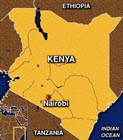Somali MPs to appoint new president amid insurgent battle
 Nairobi - Somali members of parliament (MPs) were Friday set to appoint a new president to take control of a nation under siege from Islamist insurgents.
Nairobi - Somali members of parliament (MPs) were Friday set to appoint a new president to take control of a nation under siege from Islamist insurgents.
Over a dozen candidates have emerged, but current Prime Minister Nur Hassan Hussein and Sheikh Sharif Sheikh Ahmed, the head of the moderate branch of the opposition Alliance for the Re-Liberation of Somalia (ARS), are strong favourites.
Sheik Sharif is also the head of the Islamic Courts' Union (ICU), which controlled the capital Mogadishu for six months in 2006 and briefly brought some order to the war-torn Horn of Africa nation.
The election comes after President Abdullahi Yusuf Ahmed resigned in December when parliament thwarted his attempt to sack Hussein.
Parliament was enlarged to 550 MPs on Monday to accommodate 200 members of the ARS - part of a UN-backed peace process to create a unity government.
The UN is hoping that the creation of a unity government will help bring an end to the chaos that has plagued Somalia since the 1991 ouster of dictator Mohamed Siad Barre.
However, the new government and president face a major challenge in governing Somalia.
Parliament is meeting in neighbouring Djibouti as main insurgent group al-Shabaab, a militant offshoot of the ICU, controls much of Somalia, including the seat of parliament in Baidoa.
Al-Shabaab, which has been waging a bloody insurgency since early 2007, seized Baidoa on Monday just hours after Ethiopian troops who had been propping up the central government for two years left.
The group has vowed to continue fighting to ensure that strict Islamic law is imposed in all of Somalia.
With the departure of Ethiopia, only an undermanned African Union (AU) force of around 3,000 troops from Uganda and Burundi remains to back government forces, although the two countries have put two extra battalions on standby.
The AU is trying to scrape up more troops, but the United Nations has ruled out sending in a peacekeeping force.
However, al-Shabaab faces opposition from government-aligned Islamist group Ahlu Sunnah Waljamaca, which recently seized control of two towns from al-Shabaab.
Ethiopian forces invaded in late 2006 to help kick out the ICU.
The invasion sparked a bloody insurgency that has killed an estimated 16,000 civilians and displaced around 1 million.
The conflict, combined with drought and rising food prices, has created a humanitarian catastrophe. Some 3.25 million people in Somalia, almost half the population, are dependent on food aid. (dpa)